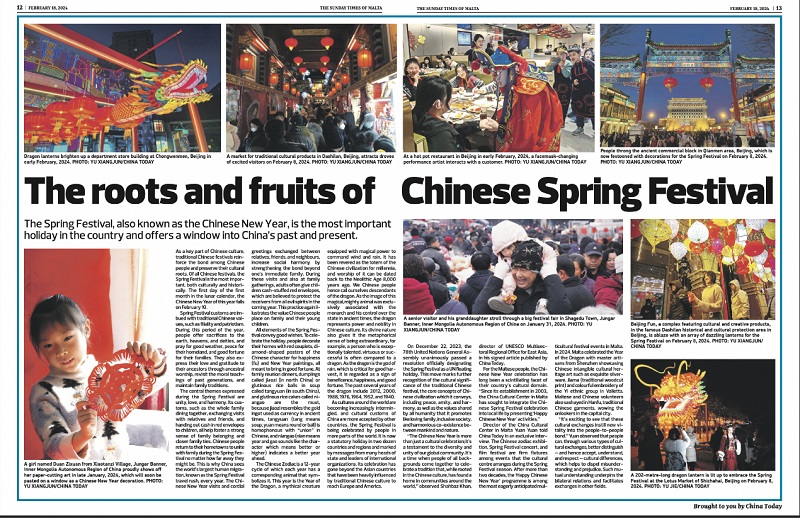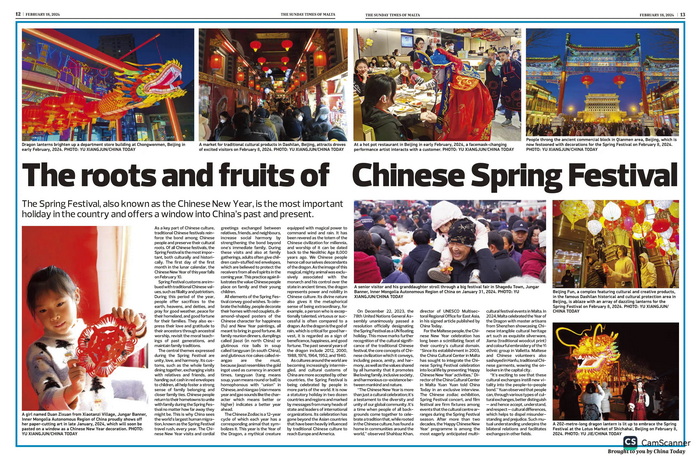China Today’s Report on Spring Festival Resonates with Maltese Readers
On February 18, 2024, The Sunday Times of Malta published China Today’s report “The roots and fruits of Chinese Spring Festival,” which has triggered a wave of discussion among Maltese readers on Chinese culture and the most important Chinese festival. The following are several pieces of feedback from Maltese scholars and a journalist.


The Chinese New Year is undoubtedly the most dynamic festival celebrated in China and by the Chinese community worldwide. The article on the festival by China Today, which appeared in The Sunday Times of Malta on February 18, 2024 (also part of the Special Report of China Today February issue), along with vivid pictures clearly highlights the true essence of the festival: the joy of celebrating the beginning of the prosperous year of the dragon with colors and activities that harmoniously bring the whole community together. Harmony is in fact the key element of the year of the dragon (loong), the fifth zodiac animal in the 12-year cycle of the Chinese lunar calendar, which embodies vitality and benevolence. In Chinese mythology, dragons are generous and auspicious creatures that live in the heavens surrounded by wind, rain, and thunder. The dragon represents the Chinese people and their sense of unity – a positive value that can be shared with the international community. As different parts of the nine animals – camel, deer, rabbit, ox, snake, clam, fish, eagle, and tiger – are sewn together to make the Chinese dragon, so are the many cultures and diverse people that comprise China and our global community. Celebrating the Chinese Spring Festival in Malta means accepting and respecting diversity by embracing unity like a dragon. All activities organized by the China Cultural Center in Malta, such as the spectacular New Year concert, the film festival, and the hanfu show gracefully performed in the historic streets of Valletta embody this unique spirit of inclusion and acceptance in our modern and multicultural community in Malta.
Salvatore Giuffrè, a Maltese sinologist who translated The Analects of Confucius from Chinese into Maltese
For me, the Spring Festival encompasses the main values cherished by the Chinese people, family ties and affection, hope in a brighter and happier future, the love of fascinating and colorful traditions, and China’s incredibly rich cultural heritage. For the festival, millions of Chinese travel to their hometowns to visit family and old friends, renewing their bonds with each other. As a lecturer in Chinese culture and history at the University of Malta, the Spring Festival always gives me many opportunities to teach about Chinese culture so I was really happy to read the wonderful article by China Today about the Spring Festival which was featured in The Sunday Times of Malta.
The article highlights how the Spring Festival has been celebrated in Malta since at least 2003. The China Cultural Center in Malta has been instrumental in familiarizing the Maltese people with this most important of Chinese traditional festivals. Now under the able directorship of Ms. Yuan Yuan, the Center continues to integrate this festival into the Maltese cultural calendar with concerts, exhibitions, and artistic performances.
The colorful images accompanying the article were also great in conveying the festive spirit. There are photos of smiling Chinese people celebrating, while in another photo, the dragon, the most important mythological creature in Chinese culture, can be seen. The year 2024 is the year of the dragon, which also happens to be the animal of the year I was born in, meaning that according to Chinese traditional culture, I was born a “dragon!”
Stephen Cachia, lecturer in Chinese history at the University of Malta
The feature “The roots and fruits of Chinese Spring Festival” by China Today published by The Sunday Times of Malta explains the significance of the Spring Festival in Chinese culture in a pleasant and fascinating way.
The festivities have their roots in the traditions of the Chinese forefathers, evoking patriotism. They are also prayers for a fruitful and good new year. The essence of the celebrations is revering ancestors and renewing family ties.
The description of the iconic Spring Festival features, like writing and putting up the Chinese character for happiness on doors, the various dishes served and the significance of the dragon, provides a colorful backdrop to explain the festivities through authentic, joyful and evocative photography. I like the photograph of Daun Zixuan proudly exhibiting her paper cutting. The photo shows how traditions are still alive in 2024 as well as the joy of family celebration. The migration of the Chinese who return to their families to renew ties is also the essence of Chinese culture.
Culture and values do not belong to one country or people but to all humanity.
I fondly remember organizing the first Maltese-Chinese literary activity in 2006 together with Tony Cassar Darien and Dr. Li, professor of literature, to celebrate the Spring Festival. A Chinese poetry and musical evening, it was held at the Manoel Theater. Poems by Li Bai and Bai Juyi, as well as poems from the Book of Songs were read out and explained to the Maltese and Chinese audience. The event presented the soul of Chinese culture across centuries.
When diverse cultures touch the essence of humanity, they become one culture.
Charles Mifsud, a Maltese cultural photojournalist
(Source:China Today)

